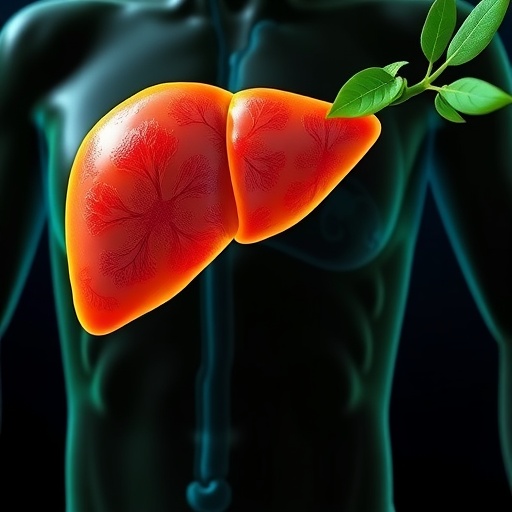Recent research has established the promising therapeutic potential of D-limonene in the management of liver conditions, particularly liver cirrhosis. This advancement stems from a study conducted by Sabbagh and colleagues, which sought to explore the anti-fibrotic and anti-inflammatory properties of D-limonene in male rats subjected to bile duct ligation, a common model for inducing liver cirrhosis. The findings, published in 2025, shed light on the crucial role that naturally occurring compounds can play in combating liver diseases, broadening the scope of potential treatment strategies.
Liver cirrhosis, characterized by the replacement of healthy liver tissue with scar tissue, can culminate in liver failure and drastically affect a patient’s quality of life. This condition often arises from chronic inflammation, leading to fibrosis, necrosis, and ultimately cirrhosis. Traditional treatment options are frequently limited, with interventions primarily aimed at slowing disease progression. The introduction of alternative therapies, such as D-limonene, which is found in citrus peels, may offer a new avenue for effective management of this debilitating condition.
D-limonene is a monoterpene, a class of compounds widely recognized for their aroma and flavor, found in the peels of citrus fruits. Beyond its sensory appeal, its therapeutic properties have garnered increasing attention in scientific circles. The compound has been credited with various health benefits, including anti-inflammatory, antioxidant, and anti-cancer effects. The recent study expands these attributes to include significant hepatoprotective effects, hinting at the vast therapeutic potential of citrus-derived compounds in liver health.
In the study, the researchers meticulously induced liver cirrhosis in male rats through bile duct ligation. This model replicates the clinical scenario of biliary obstruction, characterized by cholestasis and hepatic injury. Following the establishment of cirrhosis, the subjects were administered D-limonene to assess any ameliorative effects on liver function and histopathological alterations. The results were compelling, demonstrating a marked reduction in liver fibrosis and inflammation, indicative of the compound’s potential to modify disease progression.
Histological analysis revealed that D-limonene-treated rats exhibited a significant reduction in collagen deposition, one of the hallmarks of liver fibrosis. The decrease in collagen levels points to a biological mechanism whereby D-limonene may intervene in the fibrogenesis pathway, a critical process contributing to the progression of liver cirrhosis. In addition to its fibrotic effects, D-limonene also showed a considerable positive impact on markers of inflammation, including a reduction in pro-inflammatory cytokines, further supporting its therapeutic viability.
Moreover, the study postulates that the hepatoprotective effects of D-limonene may be attributed to its antioxidant properties. Reactive oxygen species (ROS) are known to exacerbate liver injury and promote inflammatory responses. By neutralizing these damaging species, D-limonene could shield liver cells from oxidative stress, thereby mitigating the cellular damage associated with cirrhosis. This dual action—reducing fibrosis and inflammation while enhancing oxidative defense—positions D-limonene as a multifaceted agent in liver therapy.
Furthermore, the research underscores the relevance of dietary components in liver health, advocating for the integration of natural substances into clinical practices. Given the rising prevalence of liver diseases worldwide, exploring food-based therapeutics could complement existing pharmacological treatments. The implications of such findings suggest that lifestyle modifications, including diet enriched with citrus fruits, could significantly enhance liver function and provide an adjunctive treatment option for patients with liver cirrhosis.
Despite the optimistic results, it is essential to approach the translation of these findings into clinical practice with caution. Clinical trials will be paramount to ascertain the safety and efficacy of D-limonene in human populations. The metabolic pathways involved in human subjects may differ substantially from rodent models, necessitating thorough investigation. Nonetheless, the groundwork laid by this study paves the way for future research focused on the clinical application of D-limonene in managing liver diseases.
As the scientific community continues to explore novel therapeutic avenues, the integration of natural compounds like D-limonene into conventional treatment protocols could revolutionize the management of liver cirrhosis. The growing body of evidence supporting the beneficial effects of citrus-derived compounds speaks to an enduring need for innovative approaches to tackle prevalent health issues. Researchers remain hopeful that ongoing studies will illuminate further the intricacies of D-limonene’s action and its broader implications for hepatoprotective therapies.
Overall, this promising research heralds an exciting chapter in the field of hepatology, suggesting that the incorporation of natural products into treatment regimens may have profound implications for patient care. As we advance our understanding of the link between diet, natural compounds, and liver health, it is vital to maintain a focus on rigorous scientific inquiry. This approach will ensure that emerging therapies are supported by robust evidence, ultimately contributing to improved outcomes for patients suffering from liver cirrhosis and related conditions.
Scientists anticipate that the findings regarding D-limonene may inspire further research into other natural compounds that could exert similar beneficial effects on liver health. As the search for effective therapeutic options continues, the emphasis on harnessing the power of nature may offer a pathway to innovative solutions for liver diseases. While the journey from laboratory to bedside remains lengthy, the promise shown by D-limonene encourages further exploration and mounting interest in the potential benefits of natural dietary components for liver health.
In conclusion, the study by Sabbagh et al. marks a significant advancement in understanding the therapeutic potential of D-limonene in liver cirrhosis. It underscores the potential for dietary and natural interventions in managing chronic diseases, setting the stage for future investigations that could lead to transformative treatments. The hope is that through continued exploration of natural products, science can unlock new doors to healing and better health outcomes for all.
Subject of Research: Anti-fibrotic and anti-inflammatory effects of D-limonene in liver cirrhosis
Article Title: Anti-fibrotic and anti-inflammatory effects of D-limonene in improving liver cirrhosis induced by bile duct ligation in male rat
Article References:
Sabbagh, S., Ganjirad, Z., Jafaripour, L. et al. Anti-fibrotic and anti-inflammatory effects of D-limonene in improving liver cirrhosis induced by bile duct ligation in male rat.
BMC Pharmacol Toxicol (2025). https://doi.org/10.1186/s40360-025-01054-3
Image Credits: AI Generated
DOI: 10.1186/s40360-025-01054-3
Keywords: D-limonene, liver cirrhosis, anti-fibrotic, anti-inflammatory, bile duct ligation




